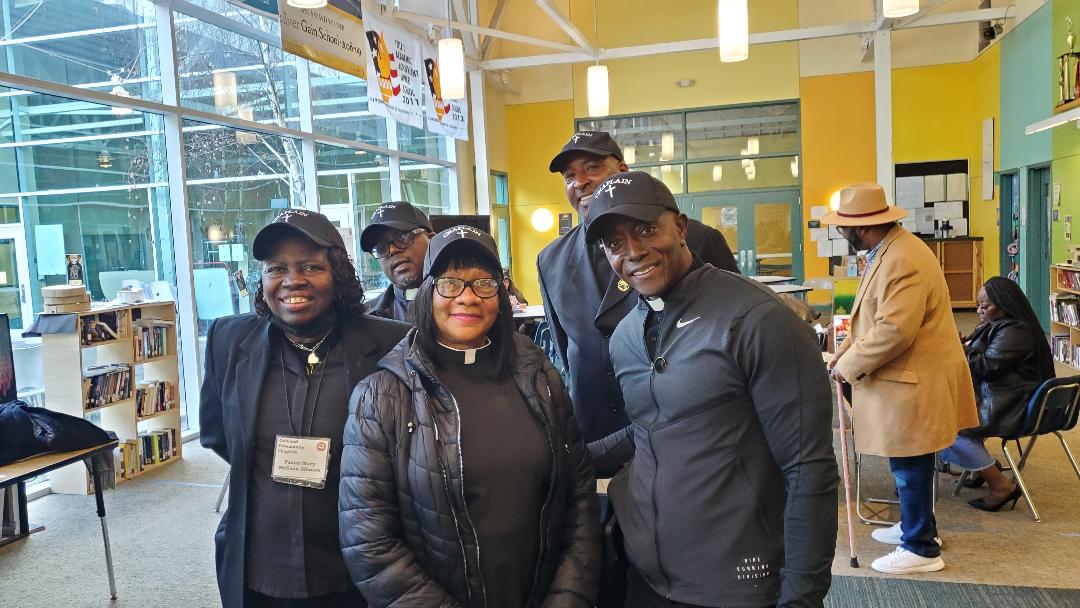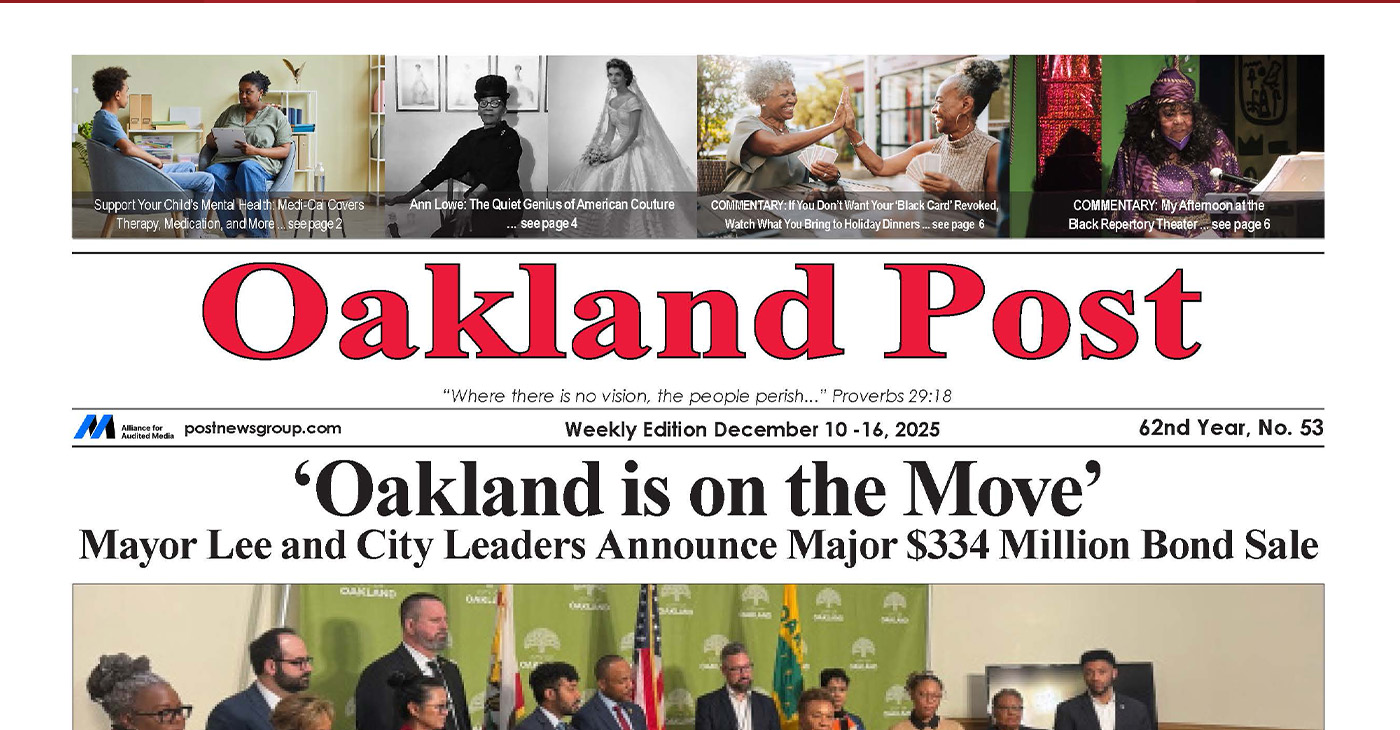Bay Area
Protesters Want Ex-Chief Armstrong Reinstated, Seek Meeting with Mayor Thao
A press conference in support of former Oakland Police Department Chief LeRonne Armstrong on Saturday, March 4 was held on the campus of The Lighthouse Community Charter School at 444 Hegenberger Road. Spearheaded by community activist Brenda Grisham, founder of the Christopher Lavell Jones Foundation Center, more than 40 people including faith leaders, chaplains, pastors and family members of homicide victims gathered to speak about what they believe to be an unjust firing of a chief they trusted and to demand the mayor reinstate him.

By Carla Thomas
A press conference in support of former Oakland Police Department Chief LeRonne Armstrong on Saturday, March 4 was held on the campus of The Lighthouse Community Charter School at 444 Hegenberger Road.
Spearheaded by community activist Brenda Grisham, founder of the Christopher Lavell Jones Foundation Center, more than 40 people including faith leaders, chaplains, pastors and family members of homicide victims gathered to speak about what they believe to be an unjust firing of a chief they trusted and to demand the mayor reinstate him.
“We are not angry,” said Grisham. “We want answers, but more importantly we want our chief back. We are not understanding why our chief, who has brought the department back into compliance, has been fired with no explanation and no discussion with the community.”
 Grisham, who lost a son to gun violence in 2010, says her multiracial coalition wants Armstrong back, not because he’s Black, but because he was a “committed and dedicated” chief.
Grisham, who lost a son to gun violence in 2010, says her multiracial coalition wants Armstrong back, not because he’s Black, but because he was a “committed and dedicated” chief.
Armstrong was fired last month after a report asserted that the former chief had failed to discipline an OPD officer whose actions violated department regulations.
Speakers described Armstrong as a leader who transformed the community’s perception of OPD and worked effectively and compassionately with family members who had lost loved ones to gun violence.
“He would get out of bed at 1 a.m. to be on the scene of homicides,” said Grisham.
Pastor Marty Peters of Victory Baptist Church and first VP of the Baptist Ministers Union of Oakland questioned the process that led to Armstrong’s suspension and later termination. He referred to the findings by a federal monitor that was appointed after the scandal that rocked OPD in the early 2000s and was projected to end in the next year.
“The moderator found 52 items to be fixed, Chief LeRonne Armstrong completed 51 of the 52. The chief was in love with his job and in love with his city, and the mayor has defamed his reputation,” Peters said.
Peters said he is also disappointed that Thao’s administration hasn’t adequately justified the chief’s firing. “He’s gone from sergeant to lieutenant, to deputy chief, to chief of police, and you refuse to tell us why you fired him when you see, Latinos, Asians, and African Americans, who stand in solidarity and in support of the chief,” Peters said, referring to Thao.
Some community members say they see a correlation between Armstrong’s termination and an increase in street violence.
Throughout OPD and the community Feb. 24 is known as “Bloody Friday,” said Daryle Allums, of “deep East Oakland” who represents Adamika Village’s Stop Killing Our Kids Movement, a victim-led violence prevention organization. There were three homicides that day with a total of five for that weekend.
Pastor Phyllis Scott, president of the Pastors of Oakland association said Armstrong went above and beyond the call of duty when he assigned a police squad to surround and protect her church during a funeral service when opposing gang members threatened to “shoot up the church.”
“Recently I performed funeral services for a young man I’d known since he was a toddler,” said Scott. “I didn’t back down and Chief Armstrong sent officers to ensure our safety.”
Scott said Armstrong helped her to re-establish the Oakland Chaplaincy Program. After approaching various churches, synagogues, the AAPI community and the LGBTQ community to recruit chaplains, the community activists were trained on how to be community chaplains.
“We then had the opportunity to assist on the scene of a homicide, visit hospitals to minister to the victims of violence, and open up our churches to perform services to families without the funds,” Scott said.
Now, Scott says he only hears about tragedy through the grapevine instead of sergeants within OPD. “We need to reinstate Chief Armstrong who had a heart and compassion for the community. The calls to our chaplaincy program have gone silent since the chief’s leave and firing.”
Several parents supported by Chief Armstrong when they had lost their children to violence were also present, holding signs of support.
Nina Carter, an East Oakland Violence Interrupter, said the mayor’s decision to fire the chief, has retraumatized the community.
“The mayor has put us in a fight, flight, freeze moment to where we don’t know what’s happening next. The mayor has not spoken on violence prevention. The message she’s sending is that she doesn’t care about the well-being of us.”
Graphic artist LeJon Loggins of Adamika Village said that Armstrong built the bridges necessary between the community and OPD. “He rebuilt the trust, so we were working with OPD better than before and bringing everyone together to solve things,” said Loggins. “Without the chief, we are back to square one — which is unfair to the community.”
PHOTO CAPTIONS:
Brenda Grisham, founder of the Christopher Lavell Jones Foundation Center speaks at a press conference in support of former Oakland Police Chief LeRonne Armstrong at the Lighthouse Community Charter School in Oakland. Photo By Carla Thomas.
Chaplains of the Oakland, re-created by Pastor Phyllis Scott and LeRonne Armstrong attend a press conference in support of Oakland Police Chief LeRonne Armstrong at the Lighthouse Community Charter School in Oakland. (Left to Right: Pastor Mary McConn Gilmore, Minister Kevin Holden, Minister Candi Thornton, Wylie Knuckles, and Tony Grayson. Photo by Carla Thomas.
Activism
Oakland Post: Week of December 10 – 16, 2025
The printed Weekly Edition of the Oakland Post: Week of – December 10 – 16, 2025

To enlarge your view of this issue, use the slider, magnifying glass icon or full page icon in the lower right corner of the browser window.
Alameda County
Seth Curry Makes Impressive Debut with the Golden State Warriors
Seth looked comfortable in his new uniform, seamlessly fitting into the Warriors’ offensive and defensive system. He finished the night with an impressive 14 points, becoming one of the team’s top scorers for the game. Seth’s points came in a variety of ways – floaters, spot-up three-pointers, mid-range jumpers, and a handful of aggressive drives that kept the Oklahoma City Thunder defense on its heels.

By Y’Anad Burrell
Tuesday night was anything but ordinary for fans in San Francisco as Seth Curry made his highly anticipated debut as a new member of the Golden State Warriors. Seth didn’t disappoint, delivering a performance that not only showcased his scoring ability but also demonstrated his added value to the team.
At 35, the 12-year NBA veteran on Monday signed a contract to play with the Warriors for the rest of the season.
Seth looked comfortable in his new uniform, seamlessly fitting into the Warriors’ offensive and defensive system. He finished the night with an impressive 14 points, becoming one of the team’s top scorers for the game. Seth’s points came in a variety of ways – floaters, spot-up three-pointers, mid-range jumpers, and a handful of aggressive drives that kept the Oklahoma City Thunder defense on its heels.
One of the most memorable moments of the evening came before Seth even scored his first points. As he checked into the game, the Chase Center erupted into applause, with fans rising to their feet to give the newest Warrior a standing ovation.
The crowd’s reaction was a testament not only to Seth’s reputation as a sharpshooter but also to the excitement he brings to the Warriors. It was clear that fans quickly embraced Seth as one of their own, eager to see what he could bring to the team’s championship aspirations.
Warriors’ superstar Steph Curry – Seth’s brother – did not play due to an injury. One could only imagine what it would be like if the Curry brothers were on the court together. Magic in the making.
Seth’s debut proved to be a turning point for the Warriors. Not only did he contribute on the scoreboard, but he also brought a sense of confidence and composure to the floor.
While their loss last night, OKC 124 – GSW 112, Seth’s impact was a game-changer and there’s more yet to come. Beyond statistics, it was clear that Seth’s presence elevated the team’s performance, giving the Warriors a new force as they look to make a deep playoff run.
Activism
Oakland Post: Week of November 26 – December 2, 2025
The printed Weekly Edition of the Oakland Post: Week of November 26 – December 2, 2025

To enlarge your view of this issue, use the slider, magnifying glass icon or full page icon in the lower right corner of the browser window.
-

 Activism4 weeks ago
Activism4 weeks agoOakland Post: Week of November 12 – 18, 2025
-

 Activism3 weeks ago
Activism3 weeks agoIN MEMORIAM: William ‘Bill’ Patterson, 94
-

 Activism4 weeks ago
Activism4 weeks agoHow Charles R. Drew University Navigated More Than $20 Million in Fed Cuts – Still Prioritizing Students and Community Health
-

 Bay Area4 weeks ago
Bay Area4 weeks agoNo Justice in the Justice System
-

 #NNPA BlackPress3 weeks ago
#NNPA BlackPress3 weeks agoBeyoncé and Jay-Z make rare public appearance with Lewis Hamilton at Las Vegas Grand Prix
-

 #NNPA BlackPress3 weeks ago
#NNPA BlackPress3 weeks agoLewis Hamilton set to start LAST in Saturday Night’s Las Vegas Grand Prix
-

 Activism3 weeks ago
Activism3 weeks agoOakland Post: Week of November 19 – 25, 2025
-

 #NNPA BlackPress4 weeks ago
#NNPA BlackPress4 weeks agoThe Perfumed Hand of Hypocrisy: Trump Hosted Former Terror Suspect While America Condemns a Muslim Mayor













































